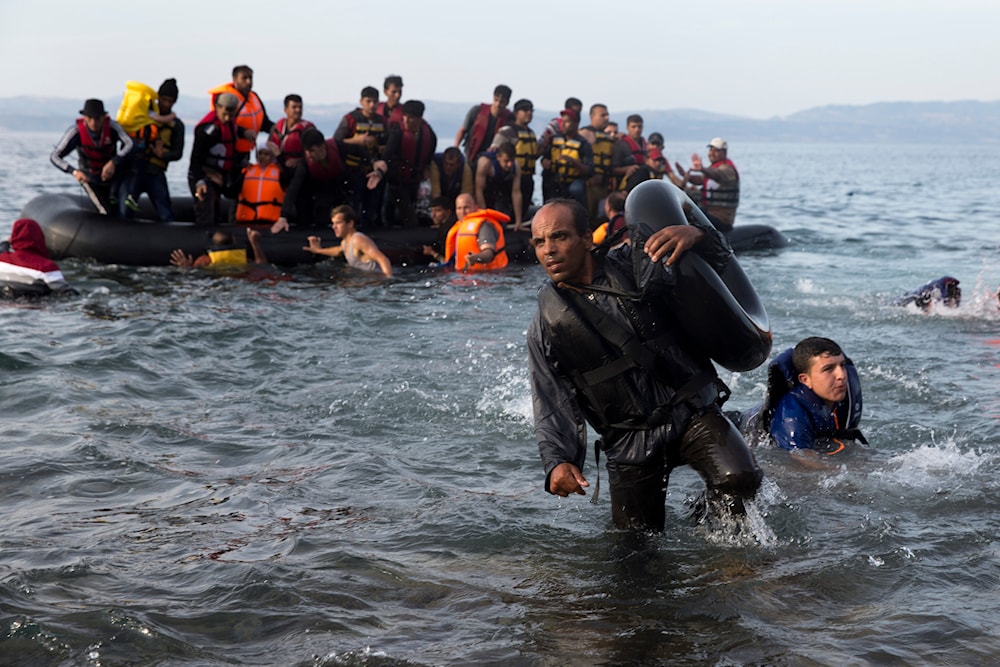Greek coastguard threw migrants overboard to their deaths: BBC
The BBC investigates the deaths of migrants in the Mediterranean at the hands of the Greek coastguard.
-

Migrants and refugees arrive on a dinghy after crossing from Turkey to Lesbos island, Greece, on September 9, 2015. (AP)
The Greek coastguard caused the deaths of dozens of migrants in the Mediterranean over three years ago, witnesses reported, including nine who were thrown into the water. According to a BBC analysis, the nine were among more than 40 people alleged to have died after being forced out of Greek territorial waters, or taken back out to sea after reaching Greek islands.
The Greek coastguard stated firmly during the BBC's investigation that it categorically denies all accusations of illegal activities.
Footage was released of 12 people being loaded into a Greek coastguard boat and subsequently abandoned on a dinghy by a former senior Greek coastguard officer. After viewing the footage, he rose from his chair, still with his microphone on, and described the incident as "obviously illegal" and "an international crime."
Read next: EU approves migration and asylum policy overhaul
The Greek government has faced longstanding accusations of conducting forced returns, which involve pushing people back towards Turkey, their point of entry, a practice deemed illegal under international law. However, this is the first time the BBC has calculated the number of incidents, alleging that fatalities occurred because of the Greek coastguard's actions.
The analysis of 15 incidents from May 2020 to 2023 revealed a total of 43 deaths. Initial sources for this data included local media, NGOs, and the Turkish coastguard.
'The ride to death'
One of the most disturbing accounts came from a Cameroonian man who claimed he was pursued by Greek authorities after arriving on the island of Samos in September 2021. Like all the people interviewed by the BBC, he stated that he intended to register on Greek soil as an asylum seeker.
"We had barely docked, and the police came from behind," he told us. "There were two policemen dressed in black, and three others in civilian clothes. They were masked, you could only see their eyes."
He and two others — one from Cameroon and another from Ivory Coast — recounted being transferred to a Greek coastguard boat, where events took a terrifying turn.
Read next: Italian government reduced illegal migrant arrivals by 60%: Meloni
“They started with the [other] Cameroonian. They threw him in the water. The Ivorian man said: ‘Save me, I don’t want to die… and then eventually only his hand was above water, and his body was below.
"Slowly his hand slipped under, and the water engulfed him."
The interviewee said his abductors beat him, describing the incident saying, "Punches were raining down on my head. It was like they were punching an animal." And then he says they pushed him, too, into the water - without a life jacket. He was able to swim to shore, but the bodies of the other two - Sidy Keita and Didier Martial Kouamou Nana - were recovered on the Turkish coastline.
The survivor’s lawyers are demanding the Greek authorities open a double murder case.
Greece's Ministry of Maritime Affairs and Insular Policy responds
Greece's Ministry of Maritime Affairs and Insular Policy informed the BBC that the footage is currently under investigation by the country's independent National Transparency Authority.
An investigative journalist interviewed by the BBC, based on the island of Samos, revealed that she began conversing with a member of the Greek special forces through the dating app Tinder.
During a phone call, the officer described his location as being on a "warship". When asked about his duties and encounters with refugee boats, he admitted to "driving them back", citing orders from the minister. He emphasized that failure to intercept a boat could result in disciplinary action.
Greece has consistently denied allegations of conducting so-called “pushbacks”.

 4 Min Read
4 Min Read








